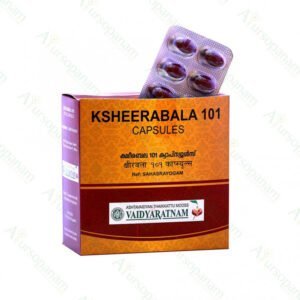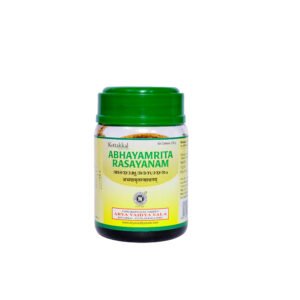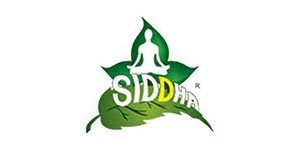‘Brihatkatpahaldi Kashaya’ improves the body’s resistance against disease and infection especiallay in the ‘Uttamanga’ or region of head and neck. It is a traditional Kashaya formulation acclaimed for its natural anti-microbial property particularly in the nasal tract, sinuses, throat, ear passages and salivary glands
‘Kashaya’ or herbal decoctions harness herbs’ healing properties and roots in a mild and easily absorbable water base. The method of preparation consists of boiling herbal ingredients in water over a low fire ensuring effective extraction of their therapeutic properties.
Features & Benefits
- Bruhath Katpahaldi Kashayam is an aqeous extract of Katphala (Strychnuc potatorum), Bhunimba (Swertia chirayita), Musta (Cyperus rotundus), Parpataka (Fumaria parviflora,Vacha (Acorus calamus), Patha (Cyclea peltata),Pushkaramula (Inula racemosa), Karkatakasringi (Pistacia integrimma), Indrayava (Holorrhoena antidysentrica), Dhanyaka (Corrandrum sativum), Sati (Kaempferia galanja), Bhringaraja (Eclipta alba),Pippali (Piper longum), Katuki (Picorrhiza kuroa), Hareethaki (Terminalia chebula), Bala (Sida cordifolia) and Dasamoola (Anti-inflammatory group of ten roots)
- It is a combination of Katphala, Mustaka, Bhunimba, Sati, Karkatasringi and Pushkaramoola has potent cleansing and anti-microbial properties.
- It is effective in managing vitiated phlegm and infection in the sinuses, nasal tract, throat, ear passage, bronchitis and adenitis. Fights off infection.
- It overthrows Kapha-Pitta vitiation in the body responsible for infection, inflammation and putrefaction.
- It enters into the circulatory channels in the body and sloughs away vitiated Kapha from the body. Facilitates healthy circulation of blood and lymph in the body.
- It stimulates metabolic pathways. Flushes out metabolic toxins from the body. Breaks down inflammatory pathways reverse inflammatory changes.
- It is effective in managing repeated inflammation of the tonsil glands. Good remedy for enlarged and infected lymph nodes in the neck.
- It is a good remedy for thyroid dysfunction. It stimulates the healthy functioning of the thyroid gland. Helps in managing obesity and associated lethargy.
Dosage and Instructions
Adult: 15-20 ml of Bruhath Katpahaldi Kashayam mixed with 45-60 ml of boiled and cooled water, twice daily on an empty stomach.
Child: 10-15 ml of Bruhath Katpahaldi Kashayam mixed with 30-45 ml of boiled and cooled water, twice daily on an empty stomach.
Key Ingredients
Bhunimba (Andrographis paniculata)
With its antibacterial and hepatoprotective properties, effective in jaundice and liver-related diseases. Also used for the treatment of snakebite, bug bite, diabetes, dysentery, fever, and malaria. The Creat is considered to be one of the most bitter plants used in traditional healthcare. Due to its bitter qualities, it is referred to as Hempedu Bumi, which means ‘Bile of the Earth’. Native to India and Sri Lanka, some cultures call the herb Mahatita, which literally translates to ‘King of Bitters’.
Musta (Cyperus rotundus)
It is commonly known as common Nutsedge. Effective in gastritis, irritable bowel syndrome. Due to its breast purification property, it is used during postpartum care to avoid indigestion to the child. Nut Grass has a long history of medicinal use in the Ayurvedic system of medicine. Its benefits have been documented in the Charaka Samhita, one of Ayurveda’s prime texts. The herb also features heavily in the medicinal texts of Chinese Traditional Medicine (CTM). in CTM, Nut Grass is credited with the ability to restore ‘qi’, the natural patterns in which the body functions.
Vacha (Acorus calamus)
It is scientifically known as Acorus calamus. Vacha is an ancient herb having various health benefits. The name “Vacha” in Sanskrit means speaking clearly because this herb stimulates intelligence and expression. in Ayurveda, Vacha is known as a rejuvenating herb because of its effect on the nervous system. It is bitter in taste and is used in dried form.
Patha (Cyclea peltata)
It is widely used in bone fracture and wound healing. It is also used in the treatment of fever and act as a breast milk purifier. It is commonly known as Indian moonseed. It enhances immunity and prevents inflammation of the respiratory passages due to its immunomodulatory and anti-inflammatory properties. It is used in conditions including infertility, wound, hypertension, and skin diseases.
Bringaraj (Ecliota alba)
Bhringaraj, popularly known as ‘false daisy’ in English is a traditional wonder herb, that is hugely recommended for growing long, silky and strong hair. This herb contains wedelolactone and demethylwedololactone, which possess hepatoprotective properties. It shows a positive effect on liver cell regeneration and is reported to be effective in the treatment of inflammatory diseases. The herb is believed to prevent aging, and maintain and rejuvenate hair, teeth and bones along with improving memory, sight and hearing. When used in hair oil, it makes hair darker and promotes hair growth. Eclipta alba is a plant used in folk and traditional medicine for treating cirrhosis and infectious diseases.
Pippali (Piper longum)
Pippali is known as “Tridoshic” herb as it suits all body types. Thus regular consumption of Pippali in the suggested quantity can help you to immune your body to quite an extent. Pippali has Anti-microbial, Anti-inflammatory activity. Consumption of Pippali is said to exhibit anti-spasmodic action and hypoglycaemic effect which is believed to lower blood sugar levels. It is also reported to be the antagonist in respiratory depression. Also due to its cooling post-digestive effect consumption of Pippali is considered as a safe and effective option to avoid all sorts of digestive disorders.
Maricha (Piper nigrum)
It is native to the Western Ghats of India. It is cultivated for its fruit, which is widely used as a spice and in traditional Indian medicine preparation. Black pepper is an appetizer and carminative commonly used in the treatment of digestive system-related complaints like dyspepsia, indigestion, flatulence, nausea, diarrhea and colic pain. in the respiratory system it acts like an Expectorant used in Cough, cold and chest congestion. Externally used as an analgesic and in Vitiligo it stimulates the production of pigments.
Pippali (Piper longum)
Pippali is known as “Tridoshic” herb as it suits all body types. Thus regular consumption of Pippali in the suggested quantity can help you to immune your body to quite an extent. Pippali has Anti-microbial, Anti-inflammatory activity. Consumption of Pippali is said to exhibit anti-spasmodic action and hypoglycaemic effect which is believed to lower blood sugar levels. It is also reported to be the antagonist in respiratory depression. Also due to its cooling post-digestive effect consumption of Pippali is considered as a safe and effective option to avoid all sorts of digestive disorders.
Maricha (Piper nigrum)
It is native to the Western Ghats of India. It is cultivated for its fruit, which is widely used as spice and in traditional Indian medicine preparation. Black pepper is an appetizer and carminative commonly used in the treatment of digestive system-related complaints like dyspepsia, indigestion, flatulence, nausea, diarrhea, and colic pain. in the respiratory system, it acts like an Expectorant used in Cough, cold, and chest congestion. Externally used as an analgesic and in Vitiligo it stimulates the production of pigments.





















































Ratings & Customer Reviews
Reviews
There are no reviews yet.